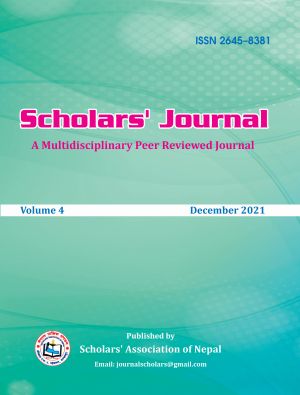नेपालमा मातृभाषामा शिक्षाको विद्यमान व्यवस्था र कार्यान्वयनको चुनौती {Challenges to the existing system and implementation of mother tongue education in Nepal}
DOI:
https://doi.org/10.3126/scholars.v4i1.42698Keywords:
existing system, भाषिक विविधता, मातृभाषा, भाषिक नीति, बहुभाषिक शिक्षा, विद्यमान व्यवस्था, Linguistic diversity, mother tongue, Linguistic policy, multilingual educationAbstract
भाषिक विविधता नेपालको मुख्य विशेषता हो । भाषिक विविधतालाई सम्बोधन गर्नका लागि मातृभाषामा शिक्षाकोव्यवस्थालाई संवैधानिक तथा नीतिगत रूपमा सुनिश्चित गरिएको छ । यसका लागि नेपालले विभिन्न अन्तर्राष्ट्रिय सन्धि,सम्झौता तथा समझदारी पत्रमा हस्ताक्षर गर्नुका साथै संविधान, ऐन, नियम, पाठ्यक्रम, शैक्षिक योजना तथा कार्यक्रममामातृभाषामा शिक्षाको व्यवस्था गरेको छ तर यस्तो व्यवस्था प्रभावकारी रूपमा कार्यान्वयन हुन सकेको छैन । विगतकोलामो एकभाषिक नीतिको प्रभाव र बहुभाषिक शिक्षाको व्यवहारिक अनुभवको अभावले बहुभाषिकता सम्बोधनमा विभिन्नचुनौतीहरू देखिएका छन् । नेपालको समग्र बहुभाषिकताको भाषिक सर्वेक्षण तथा विश्लेषण नहुनु, अभिभावकहरूमामातृभाषाप्रति अनास्था र अंग्रेजी तथा नेपाली भाषाको मोह हुनु, दक्ष एवम् तालिम प्राप्त जनशक्तिको अभाव, एउटै कक्षामाबहुभाषिक विद्यार्थी हुनु, स्तरीय पाठ्यसामग्रीको अभाव, अधिकांश भाषाको लेख्य रूप नहुनु, लेख्य रूप भएका भाषाको पनिमानक चयनमा समस्या हुनु, लिपिगत समस्या हुनु, आवश्यक पूर्वाधारको कमी तथा सरोकारवाला निकायबिच समन्वयकोअभावजस्ता विभिन्न पक्षहरू मातृभाषामा शिक्षाका लागि चुनौतीका रूपमा रहेको निष्कर्ष निकालिएको छ । प्रस्तुत लेखमातृभाषामा शिक्षाको विद्यमान व्यवस्था र चुनौतीमा केन्द्रित रहेको छ । गुणात्मक अनुसन्धान अन्तर्गत दस्तावेज विश्लेषणढाँचामा आधारित यस लेखमा पुस्तकालयीय अध्ययनबाट सामग्री सङ्कलन गरी व्याख्या विश्लेषण गरिएको छ । {Linguistic diversity is the main feature of Nepal. In order to address linguistic diversity, education in the mother tongue has been constitutionally and politically ensured. For this, Nepal has signed various international treaties, agreements and memoranda of understanding and has made provision for education in mother tongue in constitutions, acts, rules, curricula, educational plans and programs but such arrangements have not been implemented effectively. The impact of the monolingual policy of the past and the lack of practical experience in multilingual education have posed various challenges in addressing multilingualism. Lack of linguistic survey and analysis of overall multilingualism of Nepal, distrust of parents towards mother tongue and love of English and Nepali language, lack of skilled and trained manpower, multilingual students in the same class, lack of standard textbooks, It has been concluded that various aspects such as lack of written form of most of the languages, problems in standard selection of written language, script problems, lack of necessary infrastructure and lack of coordination among the concerned bodies are the challenges for mother tongue education. The present article focuses on the existing system and challenges of education in mother tongue. Based on the document analysis framework under qualitative research, this article analyzes and analyzes material collected from library studies.}
Downloads
Downloads
Published
How to Cite
Issue
Section
License
Copyright (c) 2021 सुरेन्द्र कुमार Surendra Kumar बम Bam

This work is licensed under a Creative Commons Attribution-NonCommercial 4.0 International License.
Copyright © The Authors

